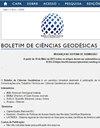具有不同电离层行为的巴西地区gps / glonass点定位评估
IF 0.5
Q3 Earth and Planetary Sciences
引用次数: 2
摘要
目前,全球定位系统(GPS)和GLONASS(Global导航卫星系统)是全球导航卫星系统(GNSS)的主要系统,也是由伽利略和北斗组成的。经过长时间的退化,GLONASS进行了现代化改造,并于2011年重建了其星座。考虑到这一新情况,随着全球定位系统和全球导航卫星系统的全星座,人们重新对联合使用这两个系统产生了兴趣。除了使用的星座外,其他因素也与定位质量有关,例如电离层的影响。已经进行了几项研究,旨在评估全球定位系统的定位质量以及电离层对其的影响,但关于全球导航卫星系统,仍有几种可能进行调查。在此背景下,本研究旨在评估GPS/GLONASS数据点定位性能,考虑到在电离层活动低和高时期具有不同电离层行为的巴西地区。观测到电离层在空间和时间上对定位性能的影响。考虑到用30分钟数据测试的所有配置,与自主GPS相比,使用GPS/GLONASS数据在97.35%的情况下提供了更好的结果,平均改善约为60cm,相当于30%。本文章由计算机程序翻译,如有差异,请以英文原文为准。
ASSESSMENT OF GPS/GLONASS POINT POSITIONING IN BRAZILIAN REGIONS WITH DISTINCT IONOSPHERIC BEHAVIOR
Nowadays GPS (Global Positioning System) and GLONASS (GLObal NAvigation Satellite System) are the main systems of GNSS (Global Navigation Satellite Systems), also composed by Galileo and BeiDou. After a long period of degradation, GLONASS was modernized, and its constellation was reestablished in 2011. Considering this new scenario, with GPS and GLONASS full constellations, the interest in the combined use of both systems was renewed. Besides the constellations used, other factors are related to the positioning quality, for instance the ionospheric influence. Several studies have been performed aiming to assess GPS positioning quality as well as the ionospheric influence on it, but concerning GLONASS, there are still several possibilities of investigation. In this context, this research aimed to assess the GPS/GLONASS data point positioning performance considering Brazilian regions with different ionospheric behavior during periods of low and high ionospheric activity. Spatial and time ionospheric influence in the positioning performance were observed. Considering all configurations tested with 30-minute data, the use of GPS/GLONASS data provided better results in 97.35% of the cases when compared to autonomous GPS, the mean improvement was about 60 cm, which corresponds to 30%.
求助全文
通过发布文献求助,成功后即可免费获取论文全文。
去求助
来源期刊

Boletim De Ciencias Geodesicas
Earth and Planetary Sciences-General Earth and Planetary Sciences
CiteScore
1.70
自引率
20.00%
发文量
10
审稿时长
3 months
期刊介绍:
The Boletim de Ciências Geodésicas publishes original papers in the area of Geodetic Sciences and correlated ones (Geodesy, Photogrammetry and Remote Sensing, Cartography and Geographic Information Systems).
Submitted articles must be unpublished, and should not be under consideration for publication in any other journal. Previous publication of the paper in conference proceedings would not violate the originality requirements. Articles must be written preferably in English language.
 求助内容:
求助内容: 应助结果提醒方式:
应助结果提醒方式:


